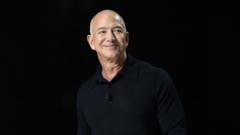The Washington Post, owned by Jeff Bezos, has announced layoffs affecting nearly 100 employees, marking a 4% reduction in staff. This move comes amid ongoing financial challenges and internal strife over editorial decisions, especially after Bezos blocked an endorsement for Vice President Kamala Harris.
Washington Post Faces Further Job Cuts Amid Financial Struggles

Washington Post Faces Further Job Cuts Amid Financial Struggles
The historic newspaper, owned by Jeff Bezos, lays off nearly 100 employees as it grapples with significant financial losses and editorial controversies.
The Washington Post is set to lay off around 100 employees, constituting about 4% of its workforce, as part of an effort to mitigate growing financial losses and organizational turmoil. According to various media reports, the layoffs primarily target business-side roles at the influential newspaper owned by Amazon's founder, Jeff Bezos. In the midst of fierce competition for advertising revenues from numerous online platforms, the Post is not alone in confronting the pressures of the digital age.
Reportedly, the layoffs were announced amid discontent within the publication after Bezos deviated from the norm by preventing the endorsement of Vice President Kamala Harris prior to the upcoming presidential election in November. The newspaper has reported losses totaling $77 million in 2023, coupled with a decline in digital readership. In response to these challenges, the Post previously offered voluntary buyouts to staff in hopes of reducing its headcount by 10%.
Bezos openly discussed his reasoning for blocking the Harris endorsement, citing concerns about growing public sentiment regarding media bias. However, the decision has faced backlash, resulting in approximately 250,000 readers canceling their subscriptions. Among the implicated fallout, several prominent journalists, including investigative reporter Josh Dawsey, have departed for rival publications, with Managing Editor Matea Gold moving to The New York Times.
Adding to the atmosphere of discontent, Pulitzer Prize-winning cartoonist Ann Telnaes resigned from the Washington Post after the paper declined to publish a politically charged cartoon featuring Bezos among other high-profile figures, suggesting they were bowing to a statue of President-elect Donald Trump. Tensions escalated further after Bezos announced financial support for Trump's inauguration fund.
As the Washington Post endeavors to navigate these tumultuous waters, the future of the publication remains uncertain in an increasingly competitive and challenging media landscape.
Reportedly, the layoffs were announced amid discontent within the publication after Bezos deviated from the norm by preventing the endorsement of Vice President Kamala Harris prior to the upcoming presidential election in November. The newspaper has reported losses totaling $77 million in 2023, coupled with a decline in digital readership. In response to these challenges, the Post previously offered voluntary buyouts to staff in hopes of reducing its headcount by 10%.
Bezos openly discussed his reasoning for blocking the Harris endorsement, citing concerns about growing public sentiment regarding media bias. However, the decision has faced backlash, resulting in approximately 250,000 readers canceling their subscriptions. Among the implicated fallout, several prominent journalists, including investigative reporter Josh Dawsey, have departed for rival publications, with Managing Editor Matea Gold moving to The New York Times.
Adding to the atmosphere of discontent, Pulitzer Prize-winning cartoonist Ann Telnaes resigned from the Washington Post after the paper declined to publish a politically charged cartoon featuring Bezos among other high-profile figures, suggesting they were bowing to a statue of President-elect Donald Trump. Tensions escalated further after Bezos announced financial support for Trump's inauguration fund.
As the Washington Post endeavors to navigate these tumultuous waters, the future of the publication remains uncertain in an increasingly competitive and challenging media landscape.





















